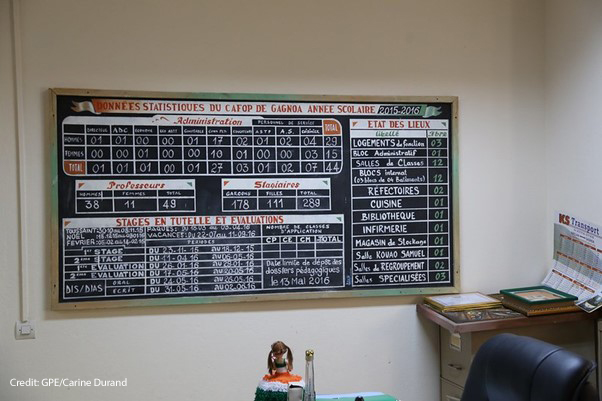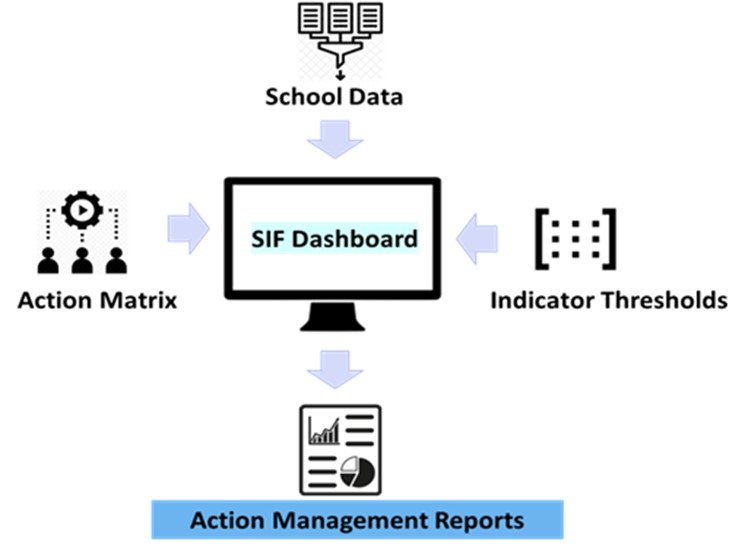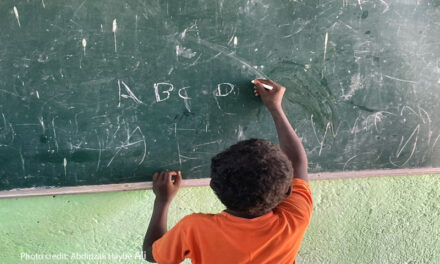This blog was written by Dr Sahar Shah. Associate Research Advisor-SAHE. It is based on a presentation given at the 2023 UKFIET conference.
Introduction to the DSI Project
In today’s globalised world, education is the bedrock upon which nations build their future. Ensuring quality and equity in education systems is a critical challenge that the Global Partnership for Education (GPE) and the International Development Research Centre (IDRC) have prioritised. Data-Driven School Improvement (DSI) is a research for development (R4D) project supported by GPE-KIX and IDRC. DSI aimed at optimising the use of Education Management Information Systems (EMIS) in countries within the KIX Europe, Asia, and Pacific (EAP) region. The focus was on scaling a promising innovation in data-driven school improvement, the School Improvement Framework (SIF) being implemented in Pakistan, and its adaptations. This aims to collect and analyse school-level data and to utilise it to identify and address school improvement needs by assigning actions to responsible individuals in the education system.
Emerging findings reveal a range of desirable and undesirable effects of scaling such an innovation across educational ecosystems within regions including Pakistan and Nepal. This blog discusses the findings from the project discussed via the perspective of the theme of the UKFIET conference held in Oxford, UK in 2023 i.e. ‘Education for Social and Environmental Justice’, with particular emphasis on three areas of discussion emphasised upon during the conference session ‘Equity, quality, sustainability, and scale: Competing factors or complementary forces? Lessons from participatory research on scaling impact in education’.
1. Quality: Managing Trade-offs Creatively
In any scaling process, making trade-offs between quality and equity may appear inevitable. The DSI project encountered such a trade off when dealing with school-level data collection in Pakistan’s Punjab province. The province has a dedicated field force of Monitoring and Evaluation Officers responsible for data collection. However, due to financial constraints, many of these positions remain vacant, leading to incomplete data collection. This posed a significant issue as schools in remote or difficult terrains were most vulnerable to being missed out during data collection, rendering the collected data inequitable. The data that was collected and analysed could not be utilised for the benefit of all schools with critical needs due to a lot of missing data.
Our research journey taught us a valuable lesson from the case of Nepal, where they adopted a cost-effective and less resource-intensive approach which involves head teachers self-reporting school-level data. This data collection practice inspired the research team to develop a hybrid model where school head teachers self-report data, while a selected group of Monitoring and Evaluation Officers visit schools, especially those schools with critical needs or those located in faraway locations, ensuring that the data is collected from all students, teachers and public schools. This approach is expected to enhance data quality while simultaneously making data collection more equitable, which is a prerequisite to embark on the journey of providing quality education.
| There is no quality education without equity, hence decision-makers must propose solutions to enhance equity across all dimensions of the educational ecosystem. |
2. Equity: GESI Sensitive Research
Equity is a term that is often thrown around, but its understanding and application vary significantly. To better identify and understand equity dimensions in our scaling work, we borrowed from the KIX GESI (Gender Equality and Social Inclusion) continuum, ranging from GESI exploitative to GESI transformative. We decided to conduct GESI-sensitive research and endeavoured to incorporate this sensitivity throughout the DSI project.
Our experiences in introducing GESI sensitivity to every stage of our research revealed an urgent need to educate people about equity concerns. During our research, we discovered misconceptions around terms like ‘disability,’ where respondents often considered it only in the context of visible physical disabilities. To probe deeper into the category of ‘non-learners’ associated with invisible learning disabilities, we realised that true equity requires a broader and more inclusive understanding of terms. Educating stakeholders, from parents to policy makers, on the nuances of equity concerns is hence critical for creating a more inclusive education system. We already started this process when we began to refine our research instruments using GESI sensitive language and concepts; when we moderated the discussion on GESI concerns during the training sessions of data collectors; when we scrutinised the SIF innovation for its GESI responsiveness in terms of its indicators and when we inquired about GESI concerns from our respondents. This process needs to continue in education research, to develop equitable education systems.
| Educating stakeholders, from parents to policy makers, on the nuances of equity concerns is hence critical for creating a more inclusive education system. |
3. Sustainability: The Need for Coordination
Sustainability is perhaps the most challenging aspect of scaling an education innovation. The DSI project encountered this when donor support for the School Improvement Framework (SIF) in Pakistan dwindled due to changing government priorities and external crises like the COVID-19 pandemic and the floods in 2022. The scalability of SIF faced a significant roadblock, due to withdrawal of technical assistance.
Sustainability relies on strong coordination among stakeholders and alignment of efforts. For instance, when the government and donors supported the implementation of SIF, it created a coordinated system for training and implementation of education officers, head teachers and government officials.
The key to sustaining the impact is keeping the system in motion. This requires coordination not only among stakeholders but also between various innovations working towards the same goal. Repurposing and modifying innovations to align with changing government priorities can help avoid creating entirely new systems and avoid duplication of resources. Hence, in a project-based ecosystem, aligning the scaling system and maintaining coordination over time is essential.
| Hence, in a project-based ecosystem, aligning the scaling system and maintaining coordination over time is essential. |
Conclusion: An Impactful Scaling Journey
Education is a fundamental human right, and it is our collective responsibility to ensure that it is both equitable and of high quality. The lessons learned through the DSI project can serve as a roadmap for others working to improve education systems worldwide via optimal utilisation of school-level data. By understanding the trade-offs, incorporating an equity lens, and fostering sustainability, we can pave the way for a brighter future where education truly leaves no one behind.
In conclusion, scaling impact need not be a tangible phenomenon, rather it could simply materialise as the generation of an idea or birth of an inspiration which eventually may set a movement in motion: a change in mind sets, a nudge towards another direction. If the DSI research project generated even a small nudge through its emphasis on conducting GESI sensitive research, then it has been an impactful scaling journey.






